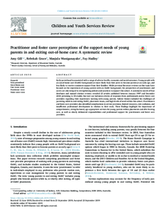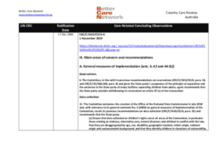Displaying 221 - 230 of 595
This chapter from the book Education in Out-of-Home Care reviews the available research on issues related to early childhood education and care (ECEC) for children in foster care in Australia and reports findings on the ECEC experiences of 60 children aged 3 to 5 years from the Australian Early Childhood in Foster and Kinship Care study.
This Chapter from Education in Out-of-Home Care illustrates that increased resourcing is needed to facilitate the achievement of improved education outcomes for Australian primary school children in out-of-home care (OHC).
This literature review sought to explore the perspectives of practitioners and foster care providers on the topic of young people in and exiting out-of-home care (OoHC) who become parents at an early age.
The objective of this study was to examine associations between being the subject of child protection reports in early childhood and diagnoses of mental disorders during middle childhood, by level of service response.
This country care review includes the care related Concluding Observations adopted by the Committee on the Rights of Persons with Disabilities and the Committee on the Rights of the Child.
This article provides an overview of literature investigating the needs of Indigenous children in residential care facilities in Australia.
This article from SBS News highlights some key findings from the recently published Family Matters Report 2019 on Aboriginal and Torres Strait Islander children in out of home care in Australia.
Child protection-involved children experience disproportionately high criminal justice system contact, yet little is known about the circumstances in which such children offend. This study sought to identify the contexts in which this group of children offend and factors associated with children being charged in each context.
The Bounce Project is a pilot youth-leadership mental health training programme co-designed with young people who have experienced out-of-home-care (OoHC). In this study, the authors evaluated the Bounce Project from the young people’s perspectives to explore the acceptability, successes and limitations of the training to promote the participant’s mental health and their contribution to system level change.
This chapter charts the application and impact of "crimmigration control" measures on unaccompanied minors, a particularly vulnerable category of migrants.


